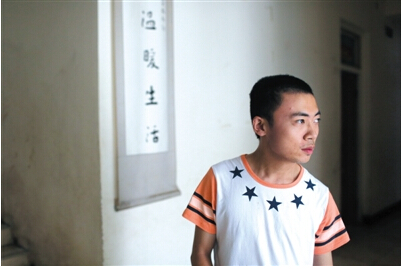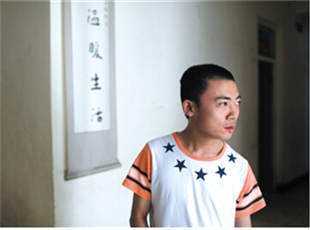From 'left-behind' children to street children
china.org.cn by Chen Xia, August 4, 2015 Adjust font size:
"Hello, mom? This is Xuanxuan. Where are you?" "I'm in Guangdong." "They said you haven't paid my allowances for six months. Where are you? Why don't you come back after going out for work?" "If I don't work, who will support us? You?"
 |
|
Lu Xuxuan. |
This was the last conversation between Lu Xuxuan and his mother. Eighteen years have passed since then. Lu never forgets it. After that call, he lost contact with her, and in the following years, he turned from a "left-behind child" into a street child.
Left-behind children refer to those children whose parents leave them to stay with friends or relatives in villages while the parents seek work in cities far from home. Due to the lack of parental care, some left-behind children end up as street children and live on the edges of society.
The 25-year-old Lu was one of the earliest "left-behind" children. He lost his family long before he was old enough to understand what "family" means.
Lu was born with deformed feet in southwest China's Sichuan Province. His parents divorced in his childhood. His mother disappeared after going to work in south China's Guangdong Province in 1997. Lu then went to Beijing to live with his father, who was also a migrant worker. But his father remarried soon afterwards, and he was forced to live with his grandparents.
Lu's grandfather was kind to him and taught him to read, but his grandmother disliked him and beat him often. The old couple quarreled for him again and again during the six years they lived together, so in 2008, Lu decided to leave their home.
Travelling and roaming in the same city were totally different experiences. "When I first came to Beijing with my mom in 1996, I felt the city was so large and wonderful," he said. "But when I ran away from home, it became totally strange to me."
He felt he had never lived such a free life, but he also felt it was like in prison. "Prison might even be better," he said.
Lu didn't spend many days on the street before he was sent to a homeless shelter, but he ran away again and returned to his hometown. Yet, none of his relatives wanted to take care of him, so he was sent to another homeless shelter.
This shelter found him a job in a charity factory, which promised to give him 2,000 yuan (US$322) and social insurance every month. But he failed to take the opportunity.
Deformity made it difficult for him to complete work assignments while taking care of himself, so he left the factory a month later. "I regret it even today," Lu said. "I had a chance to support myself."
Lu chose to return to Beijing, because he thought it would be easier to survive in a big city. However, life didn't turn out better as he expected. He had no place to live, and he was too proud to beg or scavenge garbage.
During his roaming days, he came to know other children who lived on the edges of the society. Some of them ran away from home when their parents were working outside their hometown, some were kidnapped, and some couldn't find their way home after going out to look for their parents. Many of these children were tempted to join criminal gangs soon after they arrived in Beijing.
When Lu sold maps at Beijing West Railway Station, he met a boy from a burglary gang. The boy slept in an Internet café during the day and went into small shops to steal things at night. He told Lu that it only took him seconds to break a lock and steal things worth thousands of yuan.
Lu also knew many children passing out flyers about an illegal "one-day tour" in busy commercial areas. He used to be one of them. But unlike those who simply passed out flyers, when people showed interest in the tour, he would remind them in a whisper that it was fraud.
During his roaming days, Lu did his best not to become involved in any crimes. But whatever the other children did, he could understand them. He knew they just wanted to survive.
Lu was grateful that his grandfather had taught him to read, so he knew what was right and what was wrong. He also thought he was lucky, because when he roamed around, he was old and mature enough to resist bad temptations.
And he was indeed very lucky. Five years after roaming in the street, he met a group of volunteers and was sent to a charity school in suburban Beijing. He now lives and studies in the school and helps clean the campus in his spare time.
Reflecting on his own experiences and what he saw from the other children, he thought it was the adults' responsibility that these children went astray. "Who is born a thief?" he said.
Over the past years, the well-being and healthy development of left-behind children has attracted more and more public attention. To better protect children's rights, the central government enacted a regulation on Jan. 1, 2015, stipulating that the guardian of a child shall be disqualified if he or she fails to fulfill their responsibility for more than six months, resulting in the child losing their home or means of support.
Various care services for left-behind children have also been trialed across the country. In Zhongshan City of Guangdong Province, the government hired professional community workers to help left-behind children. In Luoning County of Henan Province, the government appointed school teachers and village officials to look after left-behind children.
"A nationwide system to provide care services for left-behind children will be built in five to 10 years," said Zhang Xiaoyuan, head of the Publicity Department of the All-China Women's Federation (ACWF), a non-governmental organization aimed at protecting women and children's rights.


